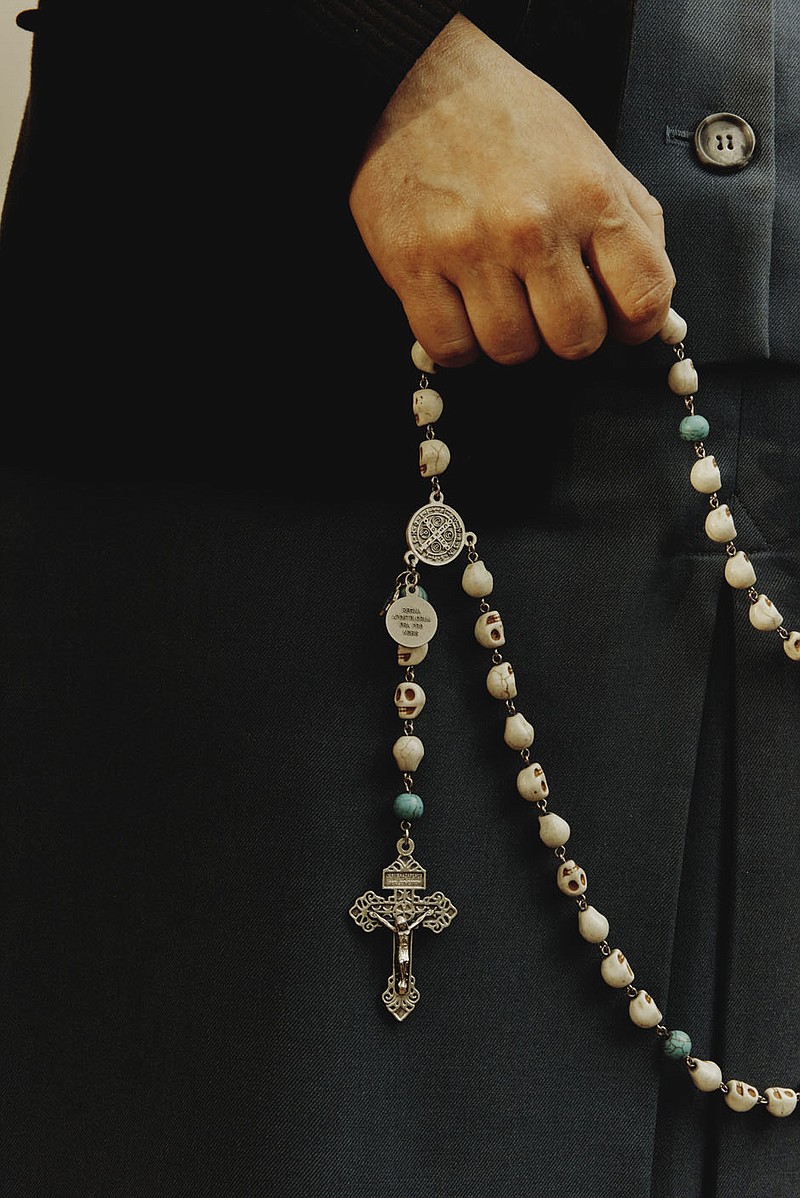Before she entered the Daughters of St. Paul convent in 2010, Sister Theresa Aletheia Noble read a biography of the order's founder, an Italian priest who was born in the 1880s. He kept a ceramic skull on his desk as a reminder of the inevitability of death. Aletheia, a punk fan as a teenager in Tulsa, Okla., thought the morbid curio was "super punk rock," she recalled recently. She thought vaguely about acquiring a skull for herself someday.
These days, Aletheia has no shortage of skulls. People send her skull mugs and skull rosaries in the mail and share photos of their skull tattoos. A ceramic skull from a Halloween store sits on her desk. Her Twitter name includes a skull-and-crossbones emoji.
That is because since 2017, she has made it her mission to revive the practice of memento mori, a Latin phrase meaning "Remember your death." The concept is to intentionally think about your own death every day as a means of appreciating the present and focusing on the future. It can seem radical in an era in which death -- until very recently -- has become easy to ignore.
"My life is going to end, and I have a limited amount of time," Aletheia says. "We naturally tend to think of our lives as kind of continuing and continuing."
Aletheia's project has reached Catholics all over the country via social media, a memento mori prayer journal -- even merchandise emblazoned with a signature skull. Her followers have found unexpected comfort in grappling with death during the coronavirus pandemic.
"Memento mori is: Where am I headed; where do I want to end up?" says Becky Clements, who coordinates religious education at her Catholic parish in Lake Charles, La., and has incorporated the idea into a curriculum used by other parishes in her diocese. "Memento mori works perfectly with what my students are facing, between the pandemic and the massive hurricanes." Clements keeps a large resin skull on her own desk, inspired by Aletheia.
Aletheia rejects any suggestion that the practice is morbid. Suffering and death are facts of life; focusing only on the "bright and shiny" is superficial and inauthentic. "We try to suppress the thought of death, or escape it, or run away from it because we think that's where we'll find happiness," she says. "But it's actually in facing the darkest realities of life that we find light in them."
The practice of regular meditation on death is a venerable one. St. Benedict instructed his monks in the sixth century to "keep death daily before your eyes," for example. For Christians like Aletheia, it is inextricable from the promise of a better life after death. But the practice is not uniquely Christian. Mindfulness of death is a tradition within Buddhism, and Socrates and Seneca were among the early thinkers who recommended "practicing" death as a way to cultivate meaning and focus. Skeletons, clocks and decaying food are recurring motifs in art history.
The Daughters of St. Paul, Aletheia's order, was founded in the early 20th century to use "the most modern and efficacious means of media" to preach the Christian message. A century ago, that meant publishing books, which the group still does. But now "modern and efficacious" means something more, and many of the women are active on social media, where they use variations on the hashtag #MediaNuns. In December, Aletheia appeared in a TikTok video created by the order, which posed cheeky Catholic matchups like evening prayer versus morning prayer and St. Peter versus St. Paul. The video, set to Run-DMC's "It's Tricky," was viewed more than 4.4 million times.
As a teenager in Tulsa, Aletheia, who is now 40, listened to the Dead Kennedys and attended local punk shows with her friends. Her parents were committed Catholics; her father has a doctorate in theology and worked for a local Catholic diocese for a while. But she was a skeptical child and declared herself an atheist as a teenager, rather than go through the formal process of joining the church.
While working on an organic farm in Costa Rica after a stint with Teach for America, she had a sudden and dramatic conversion experience: God was real, and she had to figure out his plan for her life. When her longtime boyfriend picked her up from the airport after the trip, she broke up with him and canceled her plans to go to law school. Within four years, she was wearing a habit at the convent, an unassuming blond-brick building in Boston that includes a publishing house, gardens and a small free-standing burial chapel where the nuns are entombed after they die.
Aletheia began her memento mori project on Twitter, where she shared daily meditations for more than 500 days in a row. At first, she had no particular goal beyond keeping herself committed to her own daily practice. But the tweets were a hit, and the project expanded. Now the order sells vinyl decals and hooded sweatshirts emblazoned with a skull icon designed by Sister Danielle Victoria Lussier, another Daughter of St. Paul. Aletheia continues to promote the practice on social media, and she has published a memento mori prayer journal and a devotional that opens with the sentence, "You are going to die."
The books have become some of the order's bestsellers in recent years -- a boost to the nuns, whose income as a nonprofit publisher has declined sharply in recent decades. Aletheia is currently working on a new prayer book for the Advent season, leading up to Christmas.



